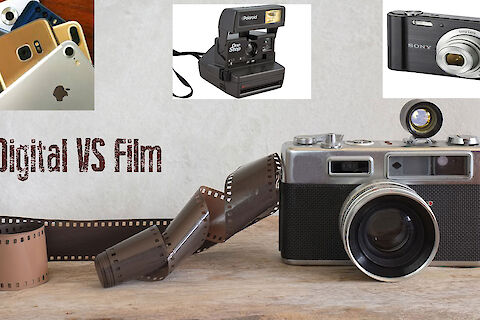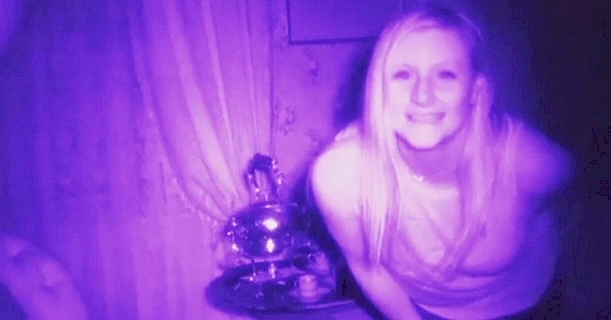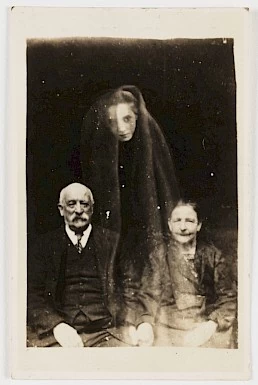

Digital VS Film Photography .... Which is Better?
Photography has been around for well over a century. Fast forward to today’s day and age and we don’t even need to buy a camera, it can be done by pressing a simple button on our smart phone. Ghost Apps and Photoshop are the thorn in every investigators side and seems to be a common occurrence with the convenience of digital photography. For this very reason, some go as far to say that film cameras are more reliable for investigating because they can't be Photoshopped. Contrary to popular belief, it is still possible to manipulate film as well during the developing process. It isn’t as convenient as Photoshop, but it can be done and in fact even back in the 1800’s, photographers would use two plates when developing film so that a ‘ghostly’ image would appear in a photo. Both can be manipulated and any sort of photo regardless of if it is taken with a digital or film camera can have a natural reaction to light which can be misinterpreted as something paranormal. So which is better? Is one more reliable than the other? I look at the pros and cons of Digital VS film photography when used for paranormal investigation.
Digital Cameras - Pros
- Convenience. You can take photos on your smart phone or small digital cameras that fit in your pocket.
- There is no developing time. The image is there ready for you to review on your computer or even on your phone screen instantaneously. There is no anxious wait at the camera store to develop film.
- You are not limited to 20 something images on a roll of film. You can take as many photos as your memory card can handle which can be in the thousands. Remember we like to take at least 3 photos of each shot so that we can review any changes in the frame.
- It is cheap. You can buy cheap digital cameras for $50 and under these days. Once you buy a memory card which can cost as little as $10 you are set. There is no ongoing cost for developing film. While some cameras use batteries, most can be charged by a charging cable.
- Lens filters can be removed on digital cameras with ease and when used in conjunction with infrared lights, you instantly have a night vision camera that can see in the dark. Some Sony cameras even have a ‘nightshot’ function which is basically the same thing, the only difference is it is ready to go, you don’t need to modify it yourself. A very popular took amongst paranormal investigators
- Photos can be loaded onto a computer where you can use software such as Lightroom and Photoshop to lighten your photos or make enhancements if you see something of interest. I personally don’t think we should be making any enhancements or changes to a photograph taken for evidence because if it is genuine, it would not need any sort of enhancement but that is just me.
- Digital cameras an smart phones also record video so you have a portable video camera right in your pocket to document your night. Double bonus. You can even strap Go Pro like cameras to your body to film or take photos at random during the night so you can focus on investigating and let the camera do it's job.

Film Cameras - Pros
- While there are not as convenient as a cell phone, the cameras are still small enough to be just as portable and can often fit into a pocket.
- Some investigators prefer using film cameras as there is less of a chance of an image being manipulated. Ghost Apps and Photoshop cannot be used and the likelihood that an image has been manipulated during the developing process while possible is also unlikely. It is possible to manipulate the images, but it is a lot more work than a digital camera.
- Film once processed comes back with the the negatives. This means you always have a copy on hand of the negative image. It means that you can easily see if it has been physically manipulated and that by comparing it to the photo once developed, you can see if there has been any tampering.
- Film cameras are capable of taking photographs using infrared technology. There are specific cameras and IR film which make this possible.
- Film cameras are point and shoot. They don’t try to focus, they don’t change the lighting if it is dark meaning there is much less of a chance of motion blur (unless you physically move when taking the photo).
- Because the image is not digital, there are no pixels meaning that pareidolia is actually less common because what you see is what you get.
- You can even purchase disposible cameras quite cheap these days so you don't have to invest in an actual camera if it is something you want to do on a casual basis.
It seems that both have their benefits, but they also have their downfalls as well.
Digital Cameras - Cons
- The biggest con is obviously how easy it is to fake or manipulate a picture. Snap a picture on your phone and then use an app to insert a ghost. Cut and paste in Photoshop or adjust the transparency. You can layer photographs on top of one another. There are so many different ways that you can ‘fake’ a photo with the click of a button.
- Using software such as Lightroom or Photoshop to ‘enhance’ the photo can actually be a double edged sword. It is very possible to over enhance a photo to the point where you may see something that isn’t really there. Any time you change lighting, you are changing how something looks. A rubbish bin in the corner could look completely different if you over enhance a photo.
- Digital cameras can take photos of different resolutions. Quite often when shooting in low light, you photo can look quite pixelated. A section of light with pixels can trigger the brain to recognise something in the image that isn’t really there – pareidolia.
- A digital camera relies on battery life. How many times have you been in an investigation and the battery drains?
- Digital cameras themselves can be too smart for their own good, especially when shooting in low light like most paranormal investigators do. If there is not enough light, the lens can find it difficult to focus. It causes things like motion blur and automatically adjusts the lighting to get the ‘optimal shot’. Even a function such as anti shake causes the photos to be modified indirectly by the camera. It means it is not a true representation of what you are shooting.
- Cameras and technology are always evolving. Once you buy it, it is already outdated and it has a much quicker shelf life.
- As you are dealing with computers, things can and will go wrong. A memory card could fail, a computer could crash during a photo transfer and you could lose everything. Because it is so easy to put everything on the computer, most investigators would not bother to process the photo. If something goes wrong and you lose all of your photos, it is gone for good.
Film Cameras - Cons
- The biggest con is that it is especially in this day and age, a costly exercise. You have to pay for film, and then you have to pay to have it processed. It is also not as easy to find a place these days that will process film. They are out there, but sometimes they are not as easy to find as they used to be.
- A roll of film has a limited amount of photos – usually around 27. On investigations, we are used to taking hundreds of photos. You have to make your 27 photos count. If you want to take more, you have to reload your film.
- You don’t know how your images look until you process them. This is for me the biggest downfall. You could have taken the best photo of your life, but you wouldn’t know. If you can’t get access back to a location, it means you can’t debunk the photo. With a digital camera you are reviewing on the spot and you can see an anomaly on the spot and potentially debunk it there and then. If days or weeks have passed by the time you get your film back, your memory is also not as good and you may forget a key point relating to the photo.
- Film can be affected if not stored correctly. Heat or touching the film with your finger can cause issues to the negative damaging the film.
- Film can be incorrectly loaded into a camera and you can go through a whole roll, take it to get processed only for them to tell you afterwards they were unable to process it.

So which is better for paranormal investigating?
They both have good and bad qualities as you can see. I personally think if you are going down the line of photography, why not incorporate both so you can reap the benefits of both. What is extremely important to remember is that whether it is a film or digital camera, both use a lens and sometimes a flash to take a photography. It means that be it film or digital, they are both prone to dust orbs, ghosting/lens flare and motion blur. You still need to be aware how a camera works and how the conditions you shoot in can influence if you do experience this phenomena and how to identify it in your photos. I personally don’t really think that photography is a reliable source of evidence, just because of how photos can be manipulated but more importantly, how many natural things can be misinterpreted as paranormal. I use a camera to document my night and to trigger my memory by taking photos of rooms and how things are set up etc. I am not expecting a figure to appear. The day it does appear in one of my photos and I cannot debunk it, I will be the first to admit I am wrong.
Regardless of what you choose, know how a camera works and how a photo is made. Learn how to properly analyse a photo . It all comes with hard work, research and a lot of practise. So which do you prefer? Film or digital? Is there a pro or con I have missed?
Don't forget to LIKE the Facebook page for updates on new content www.facebook.com/livinglifeinfullspectrum
If you enjoy LLIFS, consider buying me a book (otherwise known as buy me a coffee but I don't drink coffee and I LOVE books). Your donation helps to fund the LLIFS website so everyone can continue to access great paranormal content and resources for FREE!

Top pages with similar subjects
Don't forget to follow the Facebook page for regular updates
Join the mailing list to receive weekly updates of NEW articles. Never miss an article again!
Buy the latest and past issues Haunted Magazine
Check out the books written by LLIFS